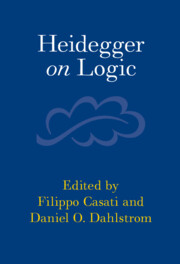Book contents
- Heidegger on Logic
- Heidegger on Logic
- Copyright page
- Contents
- Contributors
- Acknowledgments
- Method of Citation
- Introduction
- Part I Normativity, the Phenomenology of Assertions, and Productive Logic
- Part II Language, Logic, and Nonsense
- Part III Paradox, the Prospects for Ontology, and Beyond
- Chapter 7 Heidegger, Being, and All That Is and Is So
- Chapter 8 Logic and Attunement
- Chapter 9 Heidegger and the Authority of Logic
- Chapter 10 On the Limits and Possibilities of Human Thinking
- Part IV Logical Principles and the Question of Being
- References
- Index
Chapter 8 - Logic and Attunement
Reading Heidegger through Priest and Wittgenstein
from Part III - Paradox, the Prospects for Ontology, and Beyond
Published online by Cambridge University Press: 15 September 2022
- Heidegger on Logic
- Heidegger on Logic
- Copyright page
- Contents
- Contributors
- Acknowledgments
- Method of Citation
- Introduction
- Part I Normativity, the Phenomenology of Assertions, and Productive Logic
- Part II Language, Logic, and Nonsense
- Part III Paradox, the Prospects for Ontology, and Beyond
- Chapter 7 Heidegger, Being, and All That Is and Is So
- Chapter 8 Logic and Attunement
- Chapter 9 Heidegger and the Authority of Logic
- Chapter 10 On the Limits and Possibilities of Human Thinking
- Part IV Logical Principles and the Question of Being
- References
- Index
Summary
In investigating Being and the Nothing, Heidegger finds himself committed to inconsistent theses. The rational response to this conundrum would seem to be revising his commitments, but Heidegger explores a different option: retaining the inconsistent theses and rejecting the principle of noncontradiction instead. While such a stance would be anathema to most philosophers, it appears to align him with dialetheism, or the view that there can be true contradictions, whose most prominent advocate is Graham Priest. This chapter compares Heidegger’s questioning of the principle of noncontradiction and Priest’s arguments for revising traditional logic. It finds that, despite the superficial resemblance in their aims, Heidegger and Priest have fundamentally opposed conceptions of the status of logic vis-à-vis metaphysics. Heidegger’s conception of logic is actually much closer to Wittgenstein’s, especially as interpreted by Stanley Cavell. Both Wittgenstein and Heidegger stress that "attunements" enable us to communicate with one another, and they regard logic as a distillation of the structures within which we make sense. This comparison allows us to understand the importance of anxiety within Heidegger’s thought: According to him, anxiety is an experience that so alters our attunements and their associated logic that we can intelligibly philosophize about Being.
- Type
- Chapter
- Information
- Heidegger on Logic , pp. 159 - 181Publisher: Cambridge University PressPrint publication year: 2022
- 2
- Cited by



